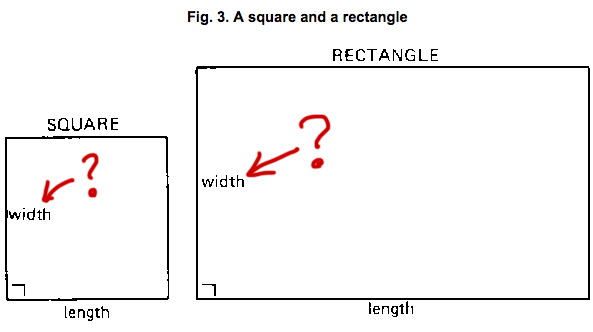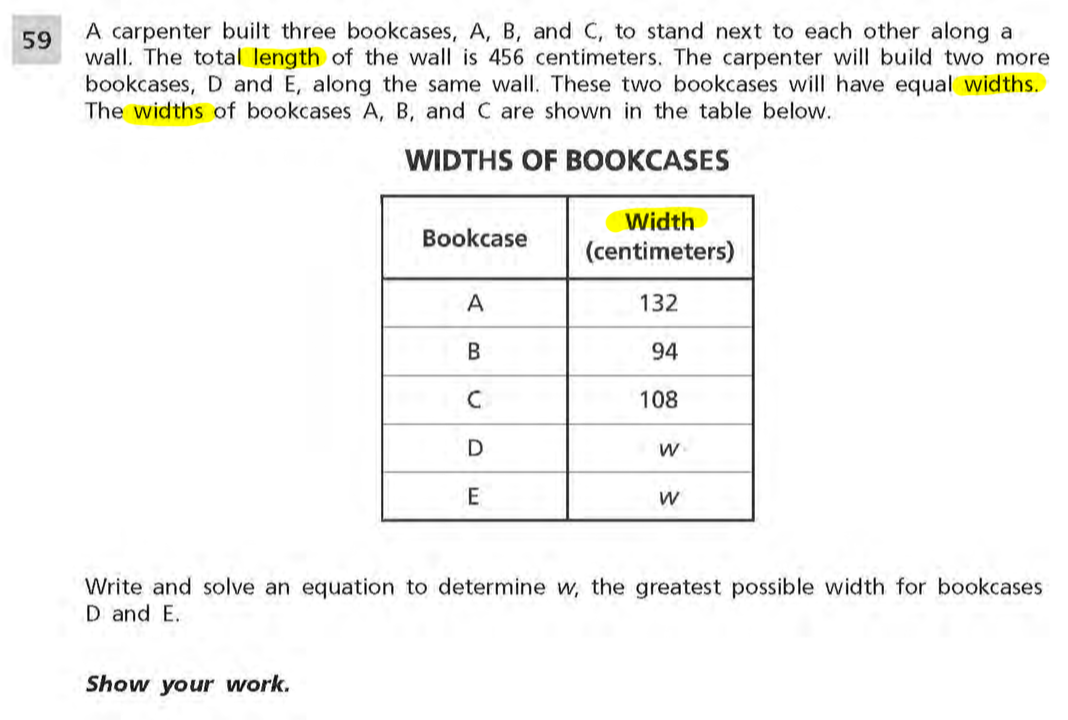Discussion Forum
This is a forum to discuss the gray areas of the English language for which you would not find answers easily in dictionaries or other reference books.
Do You Have a Question?
Latest Posts : Etymology / History
I had never thought I would ever wonder what “width” is until my 12-year old daughter came home one day and told me that her math teachers (not just one but two) told her that “width” in geometry is the vertical side of a rectangle. That to me was like saying up is down and down is up. How could this be?
It turns out that her teachers are not alone. Take a look at this page I came across while Googling on the topic. It says:
In the case of a square or a rectangle, the expression length (1) is commonly used instead of base and width (w) instead of height. In the case of a circle the expression diametre (d) is used.

“Width instead of height” is very much like saying up is down. Where did this come from?
And, what is even more disconcerting is that the teachers are not aware of this ambiguous nature of “width.” Two other teachers told me that width is always the horizontal side, and another told me that she has heard others call the vertical side “width.” So, apparently, each is teaching their students in an authoritative manner their own definition of “width.” If a 12-year old is told by her math teacher that “width” in geometry refers to the vertical side, why should she doubt it? Unless, of course, she was also told that “width” can be vertical or horizontal (i.e. direction neutral, like “length”). But that is apparently not what is happening at school in New York City.
If we teach our kids that a triangle has three sides, we don’t want them thinking that the definition of “triangle” could be flexible as if it could have four or five sides. If the definition of “width” is not universal, they need to know that. Here is a case in point. The following question was in 2016 Common Core Math Test for Grade 6.
“A carpenter built three bookcases, A, B, and C, to stand next to each other along a wall. The total length of the wall is 456 centimeters. The carpenter will build two more bookcases, D and E, along the same wall. These two bookcases will have equal widths. The widths of bookcases A, B, and C are shown in the table blow.”
Now, if you were taught that in geometry, “width” means the vertical side and “length” means the horizontal side, you would have to be confused reading this question. The correct response would be, “But why should the ‘widths’ of the bookcases have anything to do with the ‘length’ of the wall in fitting the bookcases?”
My daughter tried to figure this out by drawing a bunch of bookshelves with different heights, and eventually gave up because the question made no sense to her.
In Merriam-Webster, the word “width” has no ambiguity: “the horizontal measurement taken at right angles to the length.” After all, the word “height” has no ambiguity, so why should we think “width” would?
But looking at the Oxford dictionary gives us a slightly different answer: “The measurement or extent of something from side to side; the lesser of two or the least of three dimensions of a body.”
In other words, in a rectangle, “the lesser of the two” sides would be called “width” regardless of the orientation. So, it appears that this is an American-versus-British issue, or is it? (Note the spelling of “diametre” on the page from fao.org quoted above.)
I have searched the forum and not found any reference to this matter. More and more, I’m hearing this kind of construction: “The fact of the matter is is that we need to...” or “The biggest problem is is that we don’t have...” I’ve even heard President Obama use it. At first blush, it bothers me. There’s no need for the second “is,” and no grammatical precedent. That is to say, I don’t know what it might spill over from. Furthermore, it seems like a fairly recent arrival. What do you think? Is this something we should eschew or embrace? Has anyone else heard and taken note of this?
What is the origin of the phrase “I’m just saying”?
Can anyone tell me when and how the adding of “ish” to the end of words got started? Do we lack such confidence in ourselves that we need to add “ish” like a disclaimer to our own words? When has the word become not word enough?
When did “issue” come to mean “problem” ?
When an why did “exactly the same” become “the exact same” and more recently “the same exact”?
There exists a claim that the word “man” originally only referred to people of unimplied sex. To restate, “man” always refereed to both male and female people.
The claims I found were made by sources known by some to be categorically highly unreliable, so I turn to you.
There are claims that “wer” or “were” was used at least for adult males.
The most reliable sources I’ve found to support that are
http://www.collinsdictionary.com/...
What evidence can you provide of the use of “were” or “wer” in english and the use of “man” and whether “man” changed over time with respect to gender or whether there was always ambiguity?
I just have the impression that the old proverbs that I heard as a child aren’t heard as much today. People just don’t seem to use them much anymore.
Of course this is hard to prove: maybe I am not mixing in the right circles; maybe there are newer proverbs that have replaced the older (proverbs change with each generation); maybe the media and/or gurus have picked up some and ignored others; maybe few make into print outside the tabloids and popular magazines.
As far as the printed word goes, of those I have looked at some seem to peak around the 1930′s and then trail off, only to recover somewhat over the last decade or two. “Actions speak louder than words” was the commonest one I found, 3:1 against “Beggars can not be choosers”.
What is your impression? Is proverb use declining or just new ones becoming popular?
More and more lately I’ve been hearing and seeing a change in the prepositions used in common phrases.
I’ve already commented on PITE about the use of “deal to” instead of “deal with” in NZ, and of course we have the age old debate about “different from/to”.
Recently I noticed some others creeping in:-
“what do you make to....” instead of “what do you make make of .....”
“I have no intention on.......” instead of “I have no intention of......”.
I’m sure there are others.
While there may be nothing grammatically wrong in this, it does sound a little strange and raises the question of why and how such usage arises.
Does it stem from a desire to be different just for the sake of being different?
Is it down to some kind of narcissism?
. when saying “what reading
Will words like fæces, archæologist, fœtus disappear from our language or should they be preserved?
Latest Comments
Is a definite article (the) necessary for "most"?
- Riki104
- September 22, 2024, 11:11am
html
payid pokies australia
mark
[top 10 online casino australia](https://slotsmegacasino.com/en-au/top-10-online-casinos)
bcc
[url=https://slotsmegacasino.com/en-au/top-10-online-casinos]top 10 online casino australia[/url]
The use of SO in "the same manner or to the same extent as aforementioned; also"
- Riki104
- September 22, 2024, 11:10am
amazing
When did contacting someone become reaching out?
- Gordon Stevens
- September 20, 2024, 9:19am
If you knew how much I agree with you, You'd want to marry me.
When did contacting someone become reaching out?
- Gordon Stevens
- September 20, 2024, 9:18am
If you knew how much I agreed with you, you'd want to marry me.
“Bring” vs. “Take” differences in UK and American English
- Prashant Tiwari
- September 11, 2024, 11:24am
Knowing the available IELTS exam date 2024 options is essential for your IELTS journey. The British Council and IDP release their test dates well in advance, giving you ample time to prepare and book your slot. However, test centers tend to fill up quickly, especially in major cities and during high-demand periods. Planning ahead will help you stay organized and avoid any unnecessary stress as your test date approaches. Make sure to keep track of your preferred dates and plan your study schedule accordingly.
https://www.gradding.com/test-preparation/ielts/dates
“Bring” vs. “Take” differences in UK and American English
- Prashant Tiwari
- September 11, 2024, 11:23am
Knowing the available IELTS exam date 2024 options is essential for your IELTS journey. The British Council and IDP release their test dates well in advance, giving you ample time to prepare and book your slot. However, test centers tend to fill up quickly, especially in major cities and during high-demand periods. Planning ahead will help you stay organized and avoid any unnecessary stress as your test date approaches. Make sure to keep track of your preferred dates and plan your study schedule accordingly.
Initialisms and Quotation Marks
- AndreyMops
- September 9, 2024, 10:45am
qweqwe
What is the word for intentionally incorrect spelling?
- Tolga
- September 4, 2024, 12:13pm
Sadly It looks like after many years, there is no clear answer to this question. I was trying to find how to correctly describe Google‘s new product “Imagen”, which is an intentional misspelling of the word imagine, And pronounced “Imagine”. I asked ChatGPT and not sure where it came up with it, But when used in conjunction as the name of a product it suggested “Brandonym”, even though it made it clear that that’s not a real word and that there is no dictionary term for it.
“Let his/him come in.”
- dasej21
- September 4, 2024, 11:41am
Si estás en Chile y quieres una forma más cómoda de apostar, te recomiendo https://melbet-chile.net/los-jugadores-deberian-descargar-melbet-para-apostar-mas-comodamente/ . La descarga de la app fue rápida y sencilla, y ahora puedo hacer mis apuestas en cualquier momento y lugar. Es una gran ventaja para aquellos que no quieren perder ninguna oportunidad de apostar. La comodidad y accesibilidad de la aplicación la hacen imprescindible para cualquier apostador en Chile.






The use of SO in "the same manner or to the same extent as aforementioned; also"
The discussion on the nuances of using "so" in different contexts is fascinating. It highlights the complexities of English grammar that often go unnoticed. Understanding these subtleties can enhance our communication skills significantly. For those looking to unwind while exploring more about language or gaming, there are some excellent options available for Australian players. You might find great bonuses and games tailored to your preferences, where you can find top 10 online casino at https://slotsmegacasino.com/en-au/top-10-online-casinos. Whether it's for relaxation or excitement, there's something for everyone in the online gaming world.